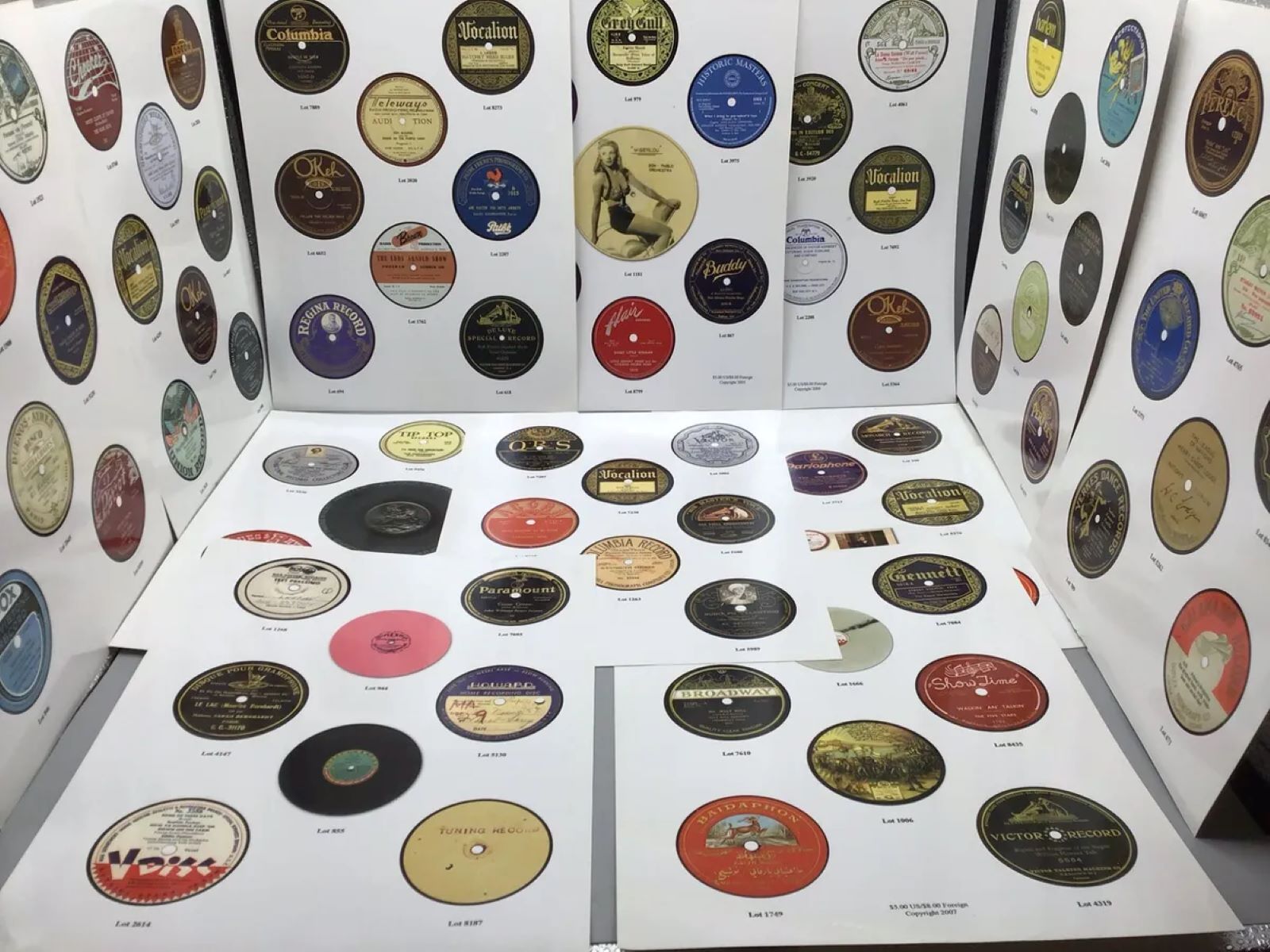Home>Production & Technology>Record Label>What All Do You Need To Start A Record Label


Record Label
What All Do You Need To Start A Record Label
Published: January 24, 2024
Start your own record label with this comprehensive guide. Find out what you need, from talent scouting to marketing strategies.
(Many of the links in this article redirect to a specific reviewed product. Your purchase of these products through affiliate links helps to generate commission for AudioLover.com, at no extra cost. Learn more)
Table of Contents
Introduction
Welcome to the exciting world of record labels! If you have a deep passion for music and are interested in turning that passion into a business, starting your own record label can be a fulfilling and rewarding endeavor. A record label acts as a platform for discovering, nurturing, and promoting talented musicians, helping them launch successful careers in the music industry.
Starting a record label requires careful planning, knowledge of the industry, and dedication. This article will guide you through the essential steps and considerations needed to start your own record label. From legal requirements to talent acquisition, marketing, and distribution, we will cover all the aspects necessary to set you on the path to success.
Whether you dream of starting a major label that signs and promotes mainstream artists, or a smaller independent label that specializes in niche genres, the fundamental principles remain the same. It’s essential to combine your passion for music with a strong business mindset to establish a sustainable and profitable record label.
Throughout this article, we will delve into the intricacies of building a record label from scratch, providing you with practical insights and tips to help you navigate the industry. Get ready to embark on an exciting journey that will require dedication, resilience, and a deep understanding of both the creative and business aspects of the music industry.
So, let’s dive in and explore the world of record labels, and discover what it takes to turn your love for music into a thriving and successful business venture!
Passion for Music
One of the fundamental prerequisites for starting a record label is a genuine passion for music. As a record label owner, you will be working closely with artists, promoting their music, and shaping their careers. Therefore, having a deep love and understanding of music is essential to create a label that resonates with both artists and audiences.
Your passion for music will drive your commitment and dedication to building a successful record label. It will be the foundation upon which you make key decisions, select artists to sign, and create a unique brand identity for your label.
To cultivate your passion for music, immerse yourself in different genres and styles. Stay updated with the latest trends and developments in the music industry. Attend live shows, explore new artists, and network with musicians and industry professionals. The more you engage with the music community, the better equipped you will be to understand and cater to the needs of your potential artists.
Additionally, having a strong understanding of the business side of the music industry is crucial. Study successful record labels and analyze their strategies and approaches. Learn about marketing, promotion, and artist management techniques. This knowledge will help you position your record label effectively in the competitive music landscape.
Having a passion for music also means being willing to take risks and embrace innovation. The music industry is constantly evolving, and being open to new trends and technologies is vital for success. Keep an eye on emerging platforms, streaming services, and digital marketing strategies. Adaptability and a willingness to experiment will keep your record label relevant and ahead of the curve.
Ultimately, your passion for music will be the driving force behind every decision and action you take as a record label owner. It will fuel your creativity, motivate your team, and attract talented artists who align with your vision. A genuine love for music is the cornerstone of a successful record label that can make a significant impact in the industry.
Business Plan
A well-thought-out and comprehensive business plan is crucial for the success of your record label. It serves as a roadmap that outlines your goals, strategies, and financial projections. A strong business plan will not only help you secure funding but also provide you with a clear direction and guide your decision-making process.
When creating your business plan, consider the following key elements:
- Mission and Vision: Clearly define the purpose and values of your record label. What is your ultimate goal? How do you plan to make a positive impact in the music industry?
- Market Analysis: Conduct thorough research to identify your target audience, competitors, and industry trends. Understand the current demand for different genres of music and identify any gaps or untapped markets.
- Artist Development and Acquisition: Outline your strategies for discovering, nurturing, and signing talented artists. How will you identify potential artists? What resources and support will you provide to help them grow their careers?
- Marketing and Promotion: Detail your marketing and promotion strategies to create buzz around your record label and its artists. Consider both traditional and digital marketing tactics, such as social media campaigns, influencer partnerships, and live performances.
- Financial Projections: Create a realistic and detailed financial forecast that includes startup costs, anticipated revenue streams, and expenses. This will demonstrate the viability and growth potential of your record label to potential investors.
- Management and Team: Identify the key individuals who will be involved in managing your record label. Outline their roles and responsibilities, and highlight their relevant experience and expertise.
- Sustainability and Longevity: Develop strategies for maintaining the sustainability and long-term growth of your record label. Consider diversifying revenue streams and building strong relationships with industry partners.
Remember to regularly review and update your business plan as your record label evolves and grows. It should be a dynamic document that reflects changing market conditions and new opportunities.
A well-crafted business plan not only serves as a guide for your own decision-making but also communicates the potential and vision of your record label to potential investors and partners. It demonstrates your professionalism, strategic thinking, and commitment to building a successful and sustainable record label.
Legal Considerations
When starting a record label, there are several legal considerations that you need to address to ensure compliance and protect your business. These legal aspects will help safeguard your label’s rights, manage contracts, and navigate copyright laws. It is crucial to consult with a qualified attorney specializing in entertainment law to assist you with these matters. Here are some key legal considerations for your record label:
- Business Structure: Decide on the most suitable business structure for your record label, such as a sole proprietorship, partnership, limited liability company (LLC), or corporation. Each structure has its own legal and tax implications, so consult with an attorney or accountant to determine the best option for you.
- Contracts and Licensing: Create legally binding contracts for artist signings, music licensing agreements, distribution deals, and more. Work with an attorney to draft these agreements, ensuring that they are fair, comprehensive, and protect the rights of both your label and the artists.
- Copyright and Intellectual Property: Familiarize yourself with copyright laws to protect the original music produced by your signed artists. Register the copyrights for their songs and albums, and ensure that proper licensing agreements are in place when using third-party music in your label’s projects.
- Music Publishing: Understand the basics of music publishing and consider whether your record label will also operate as a music publishing company. Explore the various revenue streams in music publishing, such as mechanical royalties, performance royalties, and synchronization licensing.
- Sampling and Clearances: If your artists use samples from copyrighted songs in their music, ensure that proper clearances are obtained to avoid legal issues. Failure to clear samples can result in costly lawsuits and damage to your label’s reputation.
- Digital Rights Management: In today’s digital age, it is essential to have a clear strategy for managing digital rights and royalties. Understand the complexities of streaming platforms, digital distribution, and online sales to effectively monetize your artists’ music.
- Data Privacy and Protection: Be aware of data privacy laws and regulations, especially if you collect and store personal information from your artists, employees, or customers. Take necessary measures to protect this data and ensure compliance with relevant laws.
By addressing these legal considerations and working with an experienced entertainment lawyer, you can navigate the complex legal landscape of the music industry, protect your label’s interests, and set a solid foundation for your record label’s success.
Name and Branding
The name and branding of your record label play a crucial role in establishing its identity and attracting both artists and listeners. It is essential to create a name and brand that resonates with your target audience and reflects the values and mission of your label. Here are some key considerations when it comes to naming and branding your record label:
- Choose a Memorable Name: Select a name that is unique, easy to remember, and relevant to the type of music and image you want to portray. Conduct a thorough search to ensure that the name is not already being used by another label or trademarked.
- Craft a Compelling Logo: Design a visually appealing and distinctive logo that represents your record label’s identity. Your logo should be scalable, making it suitable for various applications such as album covers, merchandise, and online platforms.
- Develop a Brand Story: Create a compelling narrative that tells the story of your record label. Highlight your mission, values, and the unique qualities that set you apart from other labels. Your brand story should resonate with artists and fans alike, creating a sense of connection and loyalty.
- Consistency Across Platforms: Ensure that your branding elements, such as your logo, color palette, and typography, are consistent across all platforms. This includes your website, social media profiles, album artwork, promotional materials, and any other touchpoints where your label is represented.
- Create a Strong Online Presence: Build an engaging website and establish active social media profiles for your record label. Use these platforms to showcase your artists, share behind-the-scenes content, and interact with fans. Consistent and engaging online presence is essential for building brand recognition and attracting a devoted audience.
- Define your Aesthetic and Visual Identity: Determine the visual style that aligns with your record label’s image. This includes choosing color schemes, font styles, and imagery that reflect the genres of music and the emotions you want to convey through your brand.
- Brand Partnerships and Collaborations: Consider partnering with other brands, influencers, or artists who align with your record label’s values and target audience. Collaborations can help amplify your reach and provide mutually beneficial opportunities for growth.
- Seek Feedback: Don’t be afraid to seek feedback from artists, industry professionals, and your target audience when developing your branding. Actively listen to their opinions and make adjustments as needed to ensure that your brand resonates with them.
Remember, your record label’s name and branding should accurately represent your values, resonate with your audience, and differentiate you from the competition. Take the time to carefully craft your brand identity, as it will shape the perception of your label and play a vital role in its long-term success.
Funding and Budgeting
Funding is a critical aspect of starting and maintaining a record label. Adequate financial resources will allow you to invest in talented artists, marketing and promotion, distribution, and other essential operations. Here are some key considerations when it comes to funding and budgeting for your record label:
- Self-Funding: If you have personal savings or access to capital, self-funding can be a viable option. This allows you to maintain control over your label and make independent decisions regarding investments and artist signings. However, be prepared for the financial risks involved, as it may take time to generate a return on your investment.
- Investors and Business Loans: Seek investment opportunities from individuals, angel investors, or venture capital firms interested in the music business. Prepare a compelling business plan and financial projections to attract potential investors. Additionally, explore business loans from banks or financial institutions that specialize in funding startups or small businesses.
- Crowdfunding: Consider utilizing crowdfunding platforms to raise funds for specific projects or album releases. Engage your fans and offer rewards such as exclusive merchandise, concert tickets, or unique experiences to incentivize their contributions.
- Grants and Sponsorships: Research and apply for grants and sponsorships from music organizations, public institutions, or corporate entities that support the arts. These sources of funding can provide a valuable influx of capital and additional resources.
- Budgeting: Develop a comprehensive budget that outlines your projected expenses and revenue streams. Include costs such as artist signings, marketing and promotion, recording and production, distribution, and overhead expenses. Be realistic and conservative in your estimates, and regularly review and adjust your budget as needed.
- Revenue Streams: Identify and diversify your revenue streams to ensure the financial stability of your record label. This may include income from album sales, streaming royalties, publishing royalties, merchandise sales, licensing deals, and live performances. Explore opportunities for brand partnerships, sync licensing, and other avenues that can generate additional revenue.
- Financial Management: Maintain accurate financial records and implement effective financial management systems. Consider hiring a professional accountant or financial advisor who can assist with bookkeeping, tax compliance, and financial planning.
- Plan for the Long Term: Anticipate the financial challenges of running a record label and plan for the long term. It may take time for your label to start generating significant revenue, so ensure that you have enough funding to sustain operations during the initial stages.
Remember, careful financial planning and budgeting are essential for the success and sustainability of your record label. By securing adequate funding and managing your finances effectively, you will be well-positioned to invest in talented artists, promote their music, and navigate the ever-changing landscape of the music industry.
Recording Studio and Equipment
A well-equipped and professional recording studio is a vital asset for your record label. It provides a space where artists can create high-quality music and allows you to maintain creative control over the production process. Here are some considerations when it comes to setting up a recording studio and acquiring the necessary equipment:
- Location: Choose a suitable location for your recording studio based on factors such as accessibility, sound isolation, and available space. Consider whether you want to build a standalone studio or rent a commercial space.
- Acoustic Treatment: Invest in proper acoustic treatment to ensure that your studio provides a neutral and accurate listening environment. This includes soundproofing, diffusion panels, bass traps, and acoustic panels.
- Recording Equipment: Acquire high-quality recording equipment, such as microphones, preamps, audio interfaces, and studio monitors. Research and choose equipment that suits the needs and budget of your record label.
- Digital Audio Workstation (DAW): Select a professional-grade DAW software that allows for efficient recording, editing, and mixing. Popular options include Pro Tools, Logic Pro, Ableton Live, and FL Studio.
- Instruments and Backline: Consider the instruments and backline gear you will need to accommodate different artists and musical styles. This may include keyboards, guitars, drums, amplifiers, and other instruments specific to certain genres.
- Studio Engineers and Producers: Hire skilled recording engineers and producers who can operate the equipment and guide the artists through the recording process. Having experienced professionals can make a significant difference in the quality of the final product.
- Editing and Mixing Software and Plugins: Invest in professional editing and mixing software and a variety of plugins to enhance the sound and provide flexibility in post-production. These tools can help shape the final sound and add creative effects.
- Backup and Storage: Implement a reliable backup and storage system to ensure the safety and accessibility of your recorded masters and project files. Regularly back up your data to external hard drives or cloud storage solutions.
- Maintenance and Upgrades: Budget for regular maintenance and system upgrades to keep your recording equipment and studio up to date. This ensures that you are utilizing the latest technology and providing the best possible recording experience for your artists.
- Collaboration and Remote Recording: Consider the growing trend of remote collaboration and provide the necessary infrastructure for remote recording sessions. Explore virtual studio platforms and online collaboration tools to expand your reach and work with artists from around the world.
Remember to prioritize the quality and reliability of your recording equipment. The success of your record label relies on delivering high-quality recordings that capture the essence and talent of your artists. By investing in a well-designed recording studio and up-to-date equipment, you create a professional environment where artists can bring their creative visions to life.
Talent Acquisition
One of the key responsibilities of a record label is to discover and sign talented artists. Building a roster of exceptional musicians is essential for the success and reputation of your label. Here are some strategies and considerations to help you attract and acquire talent:
- Research and Networking: Stay active in the music community and attend live shows, open mics, and industry events. Network with artists, managers, booking agents, and other industry professionals. Utilize online platforms, social media, and music forums to discover up-and-coming artists.
- Define Your Aesthetic and Sound: Develop a clear identity and artist direction for your record label. Determine the genres, styles, and image that align with your vision. This will attract artists who resonate with your label’s aesthetic and increase the likelihood of successful collaborations.
- Online Submissions and Demos: Create a system for artists to submit their demos and work samples to your label. Establish guidelines for submission and ensure that your team listens to and reviews submissions regularly. Provide constructive feedback to artists, even if you decide not to sign them.
- Showcase Events and Auditions: Organize showcase events or auditions where artists can perform in front of your team. This allows you to assess their talents, stage presence, and potential for growth. Consider partnering with local venues or collaborating with industry professionals to reach a wider pool of talent.
- Artist Development: Consider offering artist development services to help nurture and grow emerging talent. This can include providing resources for songwriting, vocal training, performance coaching, and connecting artists with experienced producers or session musicians.
- Publishing and Royalty Administration: Communicate the benefits of publishing administration services that your label can offer. Assisting artists with copyright registration, royalty collection, and synchronization licensing can be attractive incentives for them to sign with your label.
- Transparent and Fair Contract Negotiations: When negotiating contracts, prioritize fairness and transparency. Be clear about artist royalties, rights, and obligations. Consult with an entertainment lawyer to ensure that agreements are equitable and protect the interests of both the artist and the label.
- Build Your Reputation: As your label grows, it will become more attractive to artists. Focus on building a strong reputation by consistently releasing high-quality music, providing exceptional artist support, and delivering on your promises. Positive word-of-mouth can be a powerful tool in attracting talent.
- Long-term Relationship Building: Foster open and honest communication with your artists. Focus on building long-term relationships rather than short-term gains. Support their creative vision, offer guidance, and create an environment where artists feel valued and motivated to give their best.
Remember, talent acquisition is about more than just finding skilled musicians—it’s about finding artists who align with your label’s vision and whose careers you can help cultivate. By implementing a proactive and strategic approach to talent acquisition, you can build a roster of exceptional artists who will contribute to the growth and success of your record label.
Marketing and Promotion
Marketing and promotion are essential components in establishing the visibility and success of your record label. Effective marketing strategies will help you reach a wider audience, generate buzz around your artists, and increase overall engagement. Here are some key considerations when it comes to marketing and promotion for your record label:
- Define Your Target Audience: Determine who your ideal listeners and fans are. Understand their demographics, preferences, and consumption habits. This will guide your marketing efforts and help you tailor your messaging to resonate with your target audience.
- Build an Engaging Website: Create a user-friendly and visually appealing website that showcases your label and artists. Include artist biographies, discographies, tour dates, and links to social media profiles. Regularly update your website with news, blog posts, and other relevant content.
- Social Media Presence: Establish a strong presence on social media platforms such as Instagram, Facebook, Twitter, and YouTube. Regularly share engaging content, including music videos, behind-the-scenes footage, artist interviews, and exclusive updates. Interact with your audience through comments, direct messages, and live chats.
- Content Marketing: Create and distribute valuable and engaging content related to your label and artists. This can include blog posts, podcast episodes, video documentaries, and playlists. Position yourself as a thought leader and industry expert within your niche.
- Influencer and PR Outreach: Collaborate with influential bloggers, vloggers, influencers, and music journalists to amplify your label’s exposure. Send press releases, organize exclusive interviews, and provide reviewers with advance copies of albums and singles.
- Live Performances: Support your artists in booking live performances and touring opportunities. Organize label showcase events, partner with local venues, and participate in music festivals. Live performances provide valuable exposure and help cultivate a dedicated fan base.
- Music Videos and Visual Content: Create visually captivating music videos that capture the essence of your artists’ songs. Share them on platforms such as YouTube and Vimeo, and utilize video marketing strategies to increase visibility and engagement.
- Email Marketing: Build an email list of fans, industry professionals, and music enthusiasts who have expressed interest in your label. Send regular newsletters and updates, including new releases, exclusive content, and upcoming events. Personalize your emails and establish a direct line of communication with your audience.
- Strategic Partnerships: Collaborate with other brands, music labels, influencers, and artists to reach new audiences and gain exposure. Consider cross-promotion, joint events, and co-branded initiatives that align with your label’s values and target audience.
- Data Analytics: Utilize data analytics tools to gain insights into your audience’s preferences and behaviors. Monitor streaming metrics, social media engagement, and website analytics to refine your marketing strategies and target your promotional efforts effectively.
Remember, effective marketing and promotion require a multi-faceted approach. Combine online and offline strategies, leverage social media platforms, collaborate with influencers, and consistently evaluate the impact of your efforts. By implementing a comprehensive marketing plan, you can enhance your label’s visibility, expand your fan base, and create long-lasting connections with your audience.
Distribution and Licensing
Distribution and licensing are essential aspects of running a record label. They determine how your artists’ music reaches the audience and how you monetize their work. Effectively managing distribution and licensing can expand your reach, maximize revenue, and establish valuable industry relationships. Here are some key considerations:
- Digital Distribution: Partner with digital music distributors to ensure your artists’ music is available on platforms such as Spotify, Apple Music, Amazon Music, and other streaming services. These distributors handle the logistics of delivering music to online stores and help collect royalties.
- Physical Distribution: Determine whether physical distribution, such as CDs, vinyl, or merch, aligns with your label’s strategy and target audience. Work with distributors and retailers to ensure timely availability of physical products in stores or through e-commerce platforms.
- Music Licensing: Explore licensing opportunities for your artists’ music in commercials, films, TV shows, and video games. Collaborate with music supervisors, sync agencies, and production companies to secure placement and generate additional revenue through synchronization licensing.
- Publishing Administration: If your label also operates as a music publishing company, effectively administer your artists’ publishing rights. Ensure that proper copyright registration is in place, and collect publishing royalties from various sources such as mechanical licenses, performance licenses, and synchronization licenses.
- International Distribution: Expand your label’s reach by partnering with international distributors or licensing platforms. This allows your artists’ music to reach global audiences and tap into international markets. Research local music scenes and explore opportunities for collaborations and licensing deals.
- Direct-to-Fan Sales: Develop a direct-to-fan sales strategy by selling music and merchandise directly through your website or dedicated platforms. This allows you to establish a closer connection with your audience and retain a larger share of revenue compared to third-party platforms.
- Label Services and Aggregators: Consider using label services and aggregators that provide a range of distribution and promotional support. These services can help with marketing, playlist pitching, and coordination with digital platforms, providing valuable expertise and amplifying your label’s reach.
- Metadata and Catalog Management: Ensure accurate metadata and comprehensive catalog management for your artists’ music. This includes correct song titles, album credits, genre categorization, and proper international standard recording codes (ISRCs). Accurate metadata facilitates tracking, royalties collection, and discovery by music platforms and listeners.
- Music Rights Clearance: Understand the importance of proper music rights clearance to avoid copyright infringement issues. Educate your artists on sampling clearance, using copyrighted material, and ensuring all necessary permissions are obtained before release.
- Monitoring and Reporting: Implement systems to monitor and track your artists’ distribution and licensing activities. Regularly analyze streaming and sales data, licensing agreements, and royalty statements. This helps in assessing the effectiveness of distribution strategies and identifying opportunities for revenue optimization.
Remember, effective distribution and licensing strategies are key to ensuring that your artists’ music reaches a wide audience and generates revenue. By leveraging various distribution channels, seeking licensing opportunities, and actively monitoring and reporting on your artists’ activities, you can maximize the impact and success of your record label.
Networking and Industry Relationships
Networking and fostering industry relationships are crucial for the growth and success of your record label. Building connections with industry professionals, artists, and other stakeholders can open doors to new opportunities, collaboration, and industry insights. Here are some key considerations when it comes to networking and developing industry relationships:
- Attend Music Conferences and Events: Participate in music conferences, showcases, and industry events to connect with artists, managers, promoters, and label representatives. These events provide opportunities for networking, knowledge sharing, and discovering emerging talent.
- Join Professional Associations and Organizations: Become a member of music industry associations and organizations to gain access to resources, workshops, and networking opportunities. These communities can provide valuable insights, support, and collaboration possibilities.
- Collaborate with Other Labels and Artists: Seek opportunities for collaboration with other record labels and artists. Co-releasing projects, organizing joint events, and cross-promoting each other’s artists can expand your reach and create mutually beneficial relationships.
- Build Relationships with Music Influencers: Develop relationships with influential music bloggers, playlist curators, radio DJs, and tastemakers. Engage with their content, provide them with exclusive releases, and seek opportunities for features and interviews. Their support can significantly amplify your artists’ reach and attract a wider audience.
- Connect with Music Publishers and Sync Agencies: Foster relationships with music publishers and synchronization agencies to explore opportunities for music placements in commercials, TV shows, and films. These partnerships can generate additional revenue and increase exposure for your label and artists.
- Establish Relationships with Music Supervisors: Connect with music supervisors who oversee music selection for visual media. Building relationships with them can lead to your artists’ music being considered for placements in TV shows, films, and advertisements.
- Engage with Streaming Platforms and Playlists: Develop relationships with streaming platforms and playlist curators. Submit your artists’ music for consideration and engage with their teams to increase the likelihood of playlist placements and profile features, ultimately driving more streams and exposure.
- Collaborate with Brands and Sponsorships: Explore opportunities for brand partnerships and sponsorships that align with your label’s values and artists’ image. These collaborations can bring exposure, marketing support, and additional funding for your label’s initiatives.
- Maintain Professional Communication and Etiquette: Approach networking opportunities with professionalism, respect, and genuine interest in building relationships. Respond promptly to emails and messages, follow up after meetings or events, and always express gratitude for any support or collaboration.
- Support the Music Community: Contribute to the music community by sharing knowledge, resources, and connections. Attend and support local shows and events. Building goodwill and being actively involved in supporting others fosters a positive reputation and strengthens your network.
Remember, networking is a continuous process that requires consistent effort, genuine connection, and mutual support. By nurturing industry relationships and actively engaging with the music community, you can create meaningful connections that contribute to the growth and success of your record label.
Conclusion
Starting a record label is an exhilarating and challenging journey that requires a combination of passion for music and business acumen. Throughout this article, we have explored the essential steps and considerations involved in building a successful record label.
From nurturing a deep passion for music and developing a comprehensive business plan to navigating legal considerations and building industry relationships, each aspect plays a critical role in shaping the identity and success of your label. Remember, it is important to stay adaptable, constantly monitor industry trends, and embrace new technologies to remain competitive in the ever-evolving music landscape.
By fostering strong artist relationships, implementing effective marketing and promotion strategies, and prioritizing professional distribution and licensing, you can amplify the visibility of your artists and cultivate a loyal fan base. Building a strong network within the music industry, collaborating with influencers and brands, and staying actively involved in the music community will open doors to valuable opportunities and potential partnerships.
Starting a record label is a journey filled with challenges, but it is also an opportunity to make a lasting impact in the music industry and help talented artists achieve their dreams. Remember to stay focused, adaptable, and dedicated to your vision as you navigate the intricacies of the music business.
Now, armed with the knowledge and insights outlined in this article, you are ready to embark on your record label journey with confidence, passion, and a strategic mindset. So, go out there, discover exceptional talent, and create a record label that leaves a lasting mark on the music industry!











